Most of the metals react chemically with other substances in one form or another. Few metals which do not react with common chemicals are called noble metals e.g., silver, gold, platinum. The rate of reaction with which metals react is not same for all the metals. The rate of reaction depends on the reactivity of metals. On the basis of their reactive nature, a series known as reactivity series has been drawn in which metals are arranged in decreasing order of their reactivity.
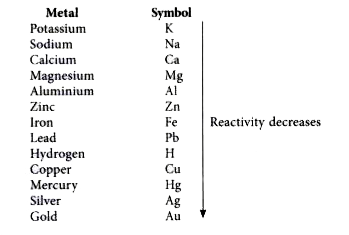
A strip of magnesium ribbon is added to some solutions of metal nitrates. Which metal nitrate will have no reaction with magnesium?
Silver nitrate
Zinc nitrate
Potassium nitrate
Lead nitrate
The correct Answer is:C
Potassium nitrate will show no reaction with magnesium as magnesium is less reactive than potassium and hence, it cannot displace potassium from potassium nitrate.
Topper's Solved these Questions
- FOOTSTEPS towards(CBSE Board)BOOK - MTG IIT JEE FOUNDATIONCHAPTER - FOOTSTEPS towards(CBSE Board)EXERCISE - SECTION - B
10 Videos
- FOOTSTEPS towards(CBSE Board)BOOK - MTG IIT JEE FOUNDATIONCHAPTER - FOOTSTEPS towards(CBSE Board)EXERCISE - SECTION - C
11 Videos
- FOOTSTEPS TOWARDS (NEET)BOOK - MTG IIT JEE FOUNDATIONCHAPTER - FOOTSTEPS TOWARDS (NEET)EXERCISE - Multiple Choice Question
45 Videos
- MATERIALS : METALS AND NON-METALSBOOK - MTG IIT JEE FOUNDATIONCHAPTER - MATERIALS : METALS AND NON-METALSEXERCISE - Olympiad/HOTS Corner
20 Videos
Similar Questions
Knowledge Check
Most of the metals react chemically with other substances in one form or another. Few metals which do not react with common chemicals are called noble metals e.g., silver, gold, platinum. The rate of reaction with which metals react is not same for all the metals. The rate of reaction depends on the reactivity of metals. On the basis of their reactive nature, a series known as reactivity series has been drawn in which metals are arranged in decreasing order of their reactivity.
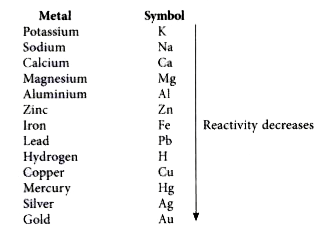
Which of the following represents the correct reactivity order of metals with water?ANa<Mg<zn<Fe<CuBNa>Zn>Fe>Mg>CuCNa>Mg>Fe>Zn>CuDNa>Mg>Zn>Fe>CuMost of the metals react chemically with other substances in one form or another. Few metals which do not react with common chemicals are called noble metals e.g., silver, gold, platinum. The rate of reaction with which metals react is not same for all the metals. The rate of reaction depends on the reactivity of metals. On the basis of their reactive nature, a series known as reactivity series has been drawn in which metals are arranged in decreasing order of their reactivity.
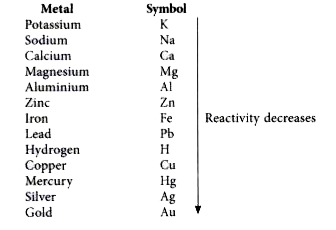
Which metal would not produce bubbles of hydrogen gas when added to dilute hydrochloric acid?AMagnesiumBSodiumCIronDSilverMost of the metals react chemically with other substances in one form or another. Few metals which do not react with common chemicals are called noble metals e.g., silver, gold, platinum. The rate of reaction with which metals react is not same for all the metals. The rate of reaction depends on the reactivity of metals. On the basis of their reactive nature, a series known as reactivity series has been drawn in which metals are arranged in decreasing order of their reactivity.
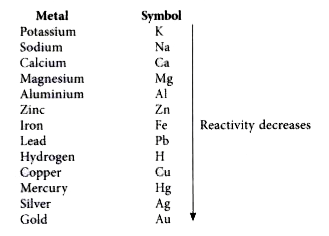
Observe the table given below:

= reaction takes place
= reaction does not take place
Identify the correct order of reactivity of the given metals.AX<Z<YBZ<X<YCX>Z>YDY<X<W
The most reactive non metal
View SolutionThe list in which metals are arranged vertically in the decreasing order of chemical reactivity is called the ____ series.
View SolutionMost of the metals react chemically with other substances in one form or another. Few metals which do not react with common chemicals are called noble metals e.g., silver, gold, platinum. The rate of reaction with which metals react is not same for all the metals. The rate of reaction depends on the reactivity of metals. On the basis of their reactive nature, a series known as reactivity series has been drawn in which metals are arranged in decreasing order of their reactivity.
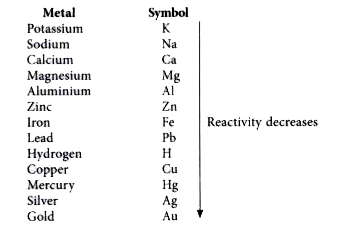
Pieces of copper, lead, aluminium and zinc are added to dilute hydrochloric acid. Which of the following test tubes most likely contains zinc?

View SolutionThe arrangement of metals on the basis of their reactivity is known as ___________.
View SolutionIdentify the most reactive metal.
View Solution

